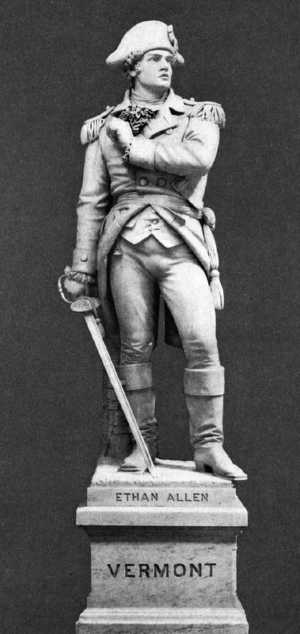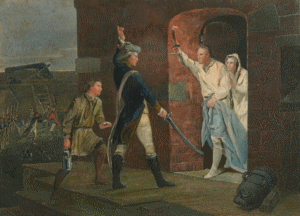 SKC Films Library SKC Films Library |
| |
| SKC Films Library >> American History >> United States: General History and Description >> The Revolution, 1775-1783 >> Individual Biography, A-Z |
 Ethan Allen Ethan Allenco-founder of the Green Mountain Boys, the unit which scored the first American victory of the Revolutionary War Ethan Allen was born in Litchfield, Connecticut, on January 10, 1737, the oldest son of a substantial farmer. A teenager when his father died, Ethan was forced to abandon his dream of attending Yale College in order to care for his mother and seven siblings. Little else about this stage of his life is known. He served briefly in the French and Indian War in 1757, and then settled in the New Hampshire Grants, in what is now western Vermont. As had most of his neighbors, Allen received his Vermont land from New Hampshire, but in 1764 the British government decided that the New Hampshire Grants belonged to New York. In 1770, New York courts ruled that land titles in Vermont were invalid and that the settlers must either buy their land a second time or face removal. Many of the settlers, however, refused to comply with either option and chose instead to resist the ruling, by force if necessary. Allen and his cousin, Seth Warner, formed the Green Mountain Boys, which spent the next several years harassing New York surveyors, sheriffs, and settlers. In response, the Governor of New York offered a reward for Allen's capture; it was never collected. While the Green Mountain Boys were resisting New York by force, other Vermonters were petitioning Great Britain for re-annexation to New Hampshire. That effort, however, became ever more difficult as tensions between Britain and her American colonies grew tense. Already sympathetic with the anti-British cause, Allen and his Green Mountain Boys decided to turn their attention to what was then a minor British outpost, Fort Ticonderoga. Situated near the southern end of Lake Champlain, Allen knew the British could easily overtake Vermont so long as the fort remained in British hands, so he decided to launch what would be the first American offensive action of the Revolutionary War. After obtaining financial support from Connecticut for his venture, Allen and his men set out on their mission. Along the way he was met by a force led by Colonel Benedict Arnold, who had been commissioned by Massachusetts to carry out the same task. After a brief round of discussion, Allen allowed Arnold and his force to accompany the Green Mountain Boys, but Allen retained control of the mission.
Having secured the first American victory of the Revolutionary War, Allen persuaded the Continental Congress to authorize the organization of a regiment of Green Mountain Boys, which would be led by officers elected by the citizens of Vermont. Those citizens chose Seth Warner to raise the regiment rather than Allen, however, because the older citizens, who constituted a majority of the voters, considered Allen too headstrong and radical for the job. No longer in charge of the Green Mountain Boys, Allen volunteered for service with the army of General Philip Schuyler, who sent him to operate behind British lines with a group of Canadian recruits. In September 1775, he and John Brown, leader of another similar group, decided to launch a surprise attack on Montreal. Unfortunately for Allen, word of the attack preceded him, and was himself surprised by a counterstrike. To make matters worse, Brown's men failed to show up, and the attack failed miserably. Captured and held until 1778, he wrote A Narrative of Col. Ethan Allen's Captivity (1779). Returning to Vermont after his release, Allen learned that Vermont had declared itself to be a free and independent republic and had unsuccessfully petitioned the Continental Congress for recognition as such. Allen tried to help the cause by threatening that Vermont would conduct separate peace negotiations with the British and become a British possession if Congress refused to recognize the republic. Not only did his threat fail to sway Congress, Allen found himself charged with treason; he was never officially tried for the crime, however. Allen's battle with the Continental Congress would be his last revolutionary act. He retired to his farm in Burlington, Vermont, in 1788, and died there on February 12, 1789. SEE ALSO |
| SKC Films Library
>> American History
>> United
States: General History and Description >> The Revolution, 1775-1783 >> Individual Biography, A-Z This page was last updated on April 11, 2017. |
